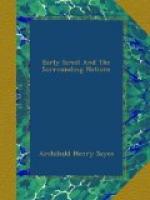The peasantry or fellahin are the Perizzites of the Hebrew Scriptures. “Perizzite,” in fact, means “villager,” and the word is a descriptive title rather than the name of a people or a race. It denotes the agricultural population, whatever their origin may have been. Another word of similar signification is Hivite. If any distinction is to be drawn between them, it is that the term Perizzite was specially applied to the fellahin of southern Canaan, while the term Hivite was restricted to the inhabitants of the north. In two passages, it is true, “Hivite” seems to be used with an ethnic meaning. Esau is said in one of them to have married the granddaughter of “Zibeon the Hivite,” while in the other we read of “the Hivite” who dwelt under Mount Hermon. But a comparison of the first passage with the later verses of the same chapter shows that “Hivite” must be corrected into “Horite,” and in the second passage it is probable that “Hittite” instead of “Hivite” should be read.
Amorite and Hittite, Canaanite and Philistine, were all alike emigrants from other lands. The Hittites had come from the mountains of Asia Minor, the Amorites had probably wandered from the northern coast of Africa, the Canaanites traced their ancestry to the Persian Gulf, the Philistines had sailed from the harbours of the Greek seas. Canaan had been inhabited, however, before any of them had found their way to it, and this prehistoric population of the country was known to the Hebrews by the name of Rephaim. In the English translation of the Bible the word is usually rendered “giants;” it seems, however, to have been a proper name, which survived in the name of one of the cities of Bashan. Doubtless it often included other elements besides that to which it was properly applied. At times it was extended to the Amorites, whose occupation of Palestine went back to a remote past, just as in the Babylonian inscriptions the name of Amorite itself was extended to the aboriginal population. Among the Philistines this older population was called Avvim, the people of “the ruins.”




